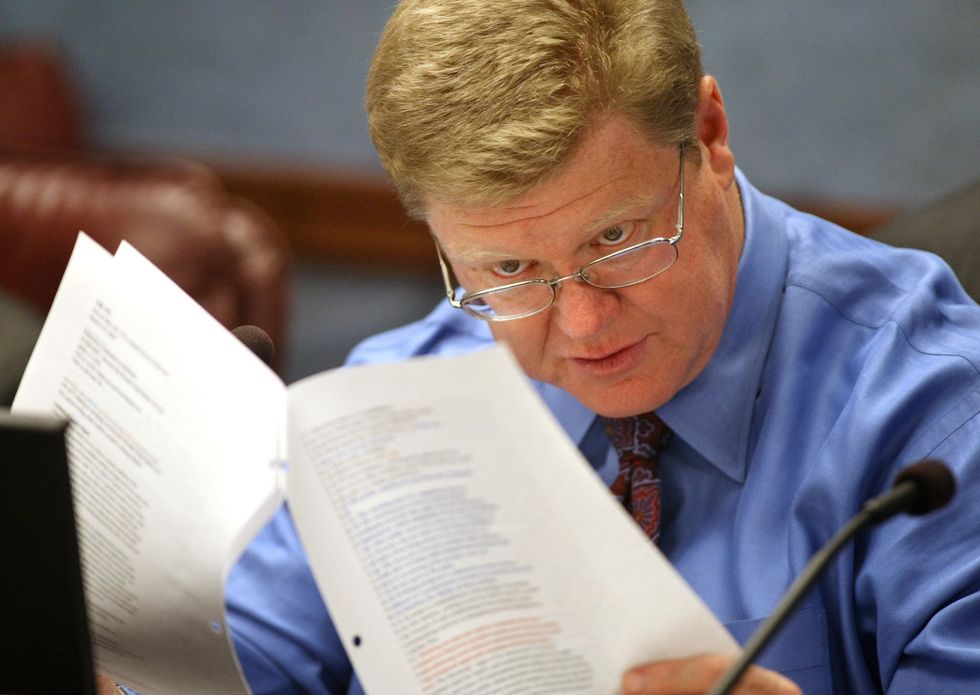
Nevada Rep. Mark Amodei (AP Photo/ Cathleen Allison)

Nevada Rep. Mark Amodei wants to take back his state’s land.
Recent legislation from the Republican lawmaker to transfer ownership of federally owned lands back to the state would most certainly be a home run for proponents of states’ rights and opponents of ever-growing federal public lands.
Amodei says the federal government currently controls more than 80 percent of all land within Nevada — a greater percentage than any other state. Thus, his legislation calls for the transfer of lands back to the state in increments.
“Nevada could generate significant net revenue for the benefit of its lands and people if it were afforded the opportunity to manage an expanded state-controlled land portfolio,” the bill states.
Logan Ramsey, a spokeswoman for Amodei, argued that while the congressman’s bill is specifically tailored to one state, it would have an impact on American taxpayers as a whole as “it would lessen the burden of federal funds used on public lands.”
“The federal government has too much land to manage that they cannot manage properly,” Ramsey said. “To put it bluntly, the [Bureau of Land Managment] has more authority over land in the state of Nevada than the governor of Nevada does.”
Matthew Anderson, a policy analyst for the Utah-based Sutherland Institute, argued that states’ control over these public lands would be more beneficial because local officials would have more reason to care for the land.
“Public lands are an integral part of Westerners’ cultural heritage, and no one has more of a vested interest in keeping them healthy than locals,” Anderson said.
And Ramsey told TheBlaze that, in most cases, local officials and management have “proven to work better and these management plans have even been praised by the federal government for their effectiveness.”
But many critics have written off Amodei’s legislation as simply a way to appease hardcore opponents of public land, such as the Bundy family, the Reno Gazette-Journal pointed out.
Lynn Davis, a senior field manager for Nevada’s National Parks Conservation Association, told the newspaper:
It needs to be pointed out that the sponsor and cosponsors of the Nevada legislation have made clear that public input is necessary as regards decisions about public lands. But, in the case of this proposed legislation, they have blatantly skirted public dialogue.Instead, they have chosen to side with the likes of Cliven Bundy and his followers who advocate — and sit in jail — for their attempts to take over federal lands.
Bundy garnered media attention after he had a standoff with federal agents in the spring of 2014 when his cattle illegally grazed on federal Nevada lands. His sons, Ryan and Ammon, were arrested earlier this year after their 41-day armed occupation of Malheur National Wildlife Refuge in Oregon.
Amodei's fellow Republican congressman, Diane Black of Tennessee, is fighting for her own legislation that would give states’ control over the permitting process for gas and oil drilling on public lands. She told TheBlaze that, while isn’t a fan of BLM, the idea that her own legislation would benefit people like the Bundy family is “a bit of a reach.” She explained:
The Federal Land Freedom Act doesn’t change ownership of any land area. So if someone is using federal lands and not paying a fee, as was the alleged case here, they would still be held responsible. My bill does, however, put an important check on the Bureau of Land Management’s overreach by delegating control of the permitting process for energy exploration on public lands to the states.
While Amodei’s and Black’s bills are different, both lay the groundwork for energy exploration and land use to become key issues to be tackled in the upcoming legislative sessions, policy experts told TheBlaze.
Amodei’s office recognizes that his legislation is strictly tailored to land use while Black’s focuses on energy development but sees a correlation between the two.
“Giving ownership of these lands back to the state would help facilitate economic development within these communities as needed … and become beneficial for the state,” said Ramsey. “For energy exploration, primarily renewable energy exploration such as geothermal, wind and solar, this could be hugely beneficial.”